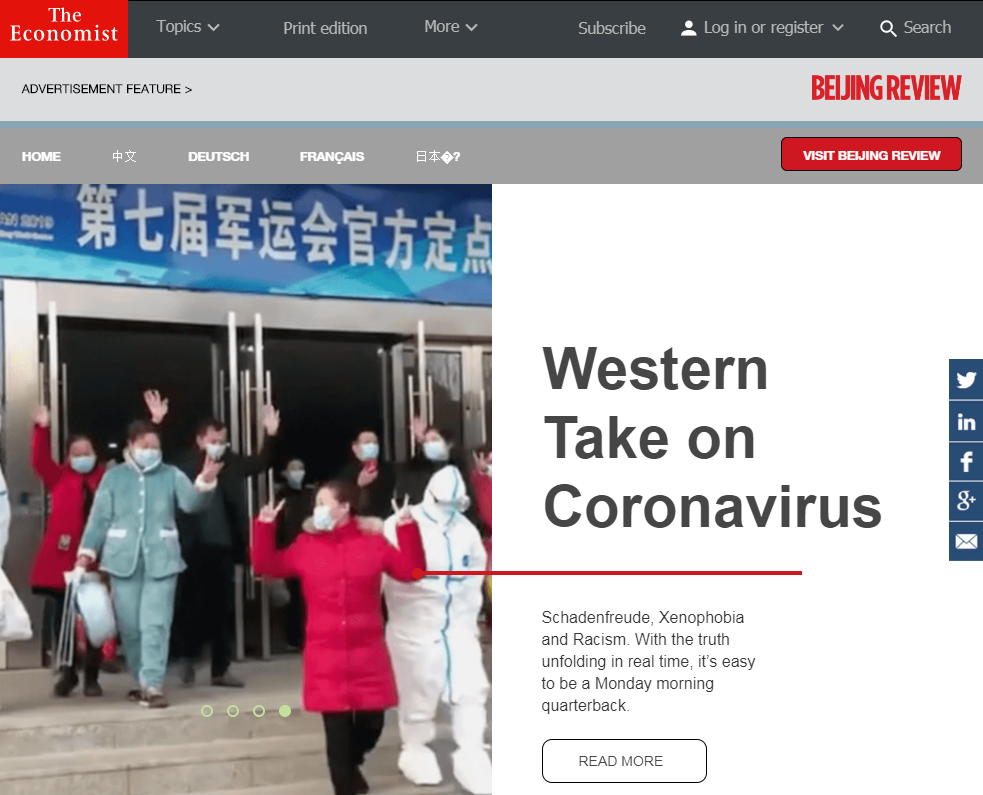Paid content from the Beijing Review included an article attacking western news outlets and defending China’s botched response to the coronavirus outbreak.
In April, I bylined a story in BuzzFeed News about how during the pandemic, British newspaper The Daily Telegraph continued to sell advertising space on its site to the People’s Daily Online, the official newspaper and mouthpiece of the Chinese Communist Party (CCP), enabling it to publish state propaganda and medical disinformation aimed at a British audience.
As reported in another story I co-bylined with Jim Waterson for The Guardian later that month, The Daily Telegraph subsequently cut ties with the People’s Daily Online and another China-backed newspaper, China Daily, which for more than a decade reportedly paid the Telegraph £750,000 annually to carry a supplement called China Watch.
Now it appears that The Economist, the international weekly newspaper, has disappeared an “advertisement feature” on its site paid for by the CCP-backed Beijing Review.
The section, dubbed “China Focus,” included titles such as “Western Take on Coronavirus: Schadenfreude, Xenophobia and Racism” by Beijing Review associate executive editor Liu Yunyun. Her article claimed that “Accusations [by western news and media outlets] of the [Chinese] government hiding the scope of the disease” are based on “Rumors, misinformation and fears,” and that “Global readers are largely kept in the dark” about how “China is sacrificing its own economy to keep the world safe.”
That article, and others like it, were previously available via the subdomain, chinafocus.economist.com. But now when you click on that link, you’re directed to an HTTP 503 error page, which occurs whenever a server is “unable to handle the request due to a temporary overloading or maintenance of the server,” according to the World Wide Web Consortium, founded in 1994 by Tim Berners-Lee.
Site information for chinafocus.economist.com states that its security certificate expired on July 26. A message reads: “This certificate has expired or is not yet valid.”
The 503 error page went up shortly after I emailed The Economist’s global communications SVP Lauren Hackett on April 16 asking her to comment on a petition by British non-profit advocacy group Free Tibet, calling on western media outlets to “STOP SPREADING CCP PROPAGANDA.”
Here’s her April 17 reply email:
Dear Dean – Thank you for reaching out on this. I’ll have to look into it. Can you let me know who you are writing for and the focus of your story. Kind regards, Lauren
Hackett and The Economist did not reply to multiple follow-up emails I sent asking the paper to clarify whether it had cut ties with the Beijing Review. But here’s what Free Tibet’s campaign manager John Jones sent me when I asked him for comment:
We have been following China Watch and its presence in papers like The Telegraph for a couple of years now with a mixture of despair and grim fascination. Some of the articles last year on “60 years of democracy in Tibet” were particularly appalling, with articles titled “Tibet marks 60th anniversary of democratic reform” and “Memorial Hall built to commemorate freed Tibetan slaves” appearing in The Telegraph. This anniversary and alleged freeing of slaves is actually a reference to what Tibetans know as the Tibetan Uprising, when thousands of Tibetans in the capital, Lhasa, gave their lives to protest against the Chinese occupation of their country. Since then, occupied Tibet has become an increasingly repressive place. Freedom House, a think tank that compares the openness of different societies around the world, has for the past five years ranked Tibet as the second worst place in the world for political freedoms and civil rights, ahead of only Syria (some of their analysis is here in their latest report: https://freedomhouse.org/country/tibet/freedom-world/2020). For media outlets in free societies to be running material praising the dire state of affairs in Tibet is truly shocking.
Our hope for this new campaign action is that the editors of The Economist and Wall Street Journal drop content that is nothing more or less than Chinese government backed propaganda from their publications. It does seem that the coronavirus and some of the nonsense reporting on it by Chinese state media has sent a signal to several newspaper editors that these puff pieces can be dangerous in the falsehoods that they spread, not just for the billion people under CCP rule but also for their own readers. There is a backlash against disinformation around the pandemic and neither of these newspapers will want to be associated with that in any way. We hope that this will have set off alarms in their minds that it really is not ethical to run features that ultimately are the product of a dictatorial government and that what we need at the moment is scrutiny of the CCP – scrutiny of their handling of the pandemic and their silencing of whistleblowers, but also scrutiny of their treatment of the Uyghurs and scrutiny of their repressive rule in Tibet. If the readers of The Economist and The Wall Street Journal make it clear that they do not want to see this content then there is a great chance that these two outlets could follow in the footsteps of The Telegraph, The New York Times and The Washington Post and scrap these propaganda sections.
It’s unclear whether the print edition of The Economist is still carrying the Beijing Review material, as U.S. news site the Washington Free Beacon reported in March. To anyone who knows the answer, please get in touch by leaving a comment below, or by clicking here.


2 responses to “The Economist Disappears “Advertisement Feature” Paid for by Chinese State-Backed Paper”
[…] https://shootingthemessenger.blog/2020/08/10/the-economist-disappears-advertisement-feature-paid-for… […]
[…] “The Economist Disappears ‘Advertisement Feature’ Paid for by Chinese State-Backed… via this blog, August 10, […]